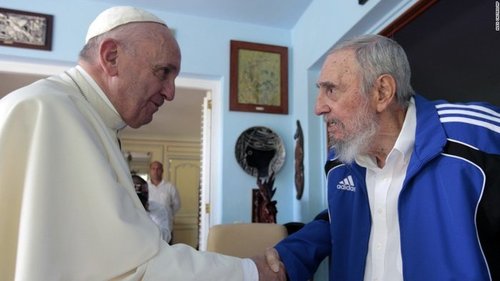
US and Catholicism in Crisis
09/21/2015
During the 1950s, the twin pillars of worldwide anti-communism were Dwight Eisenhower’s America and the Roman Catholic Church of Pope Pius XII.
During the 1980s, the last decade of the Cold War, Ronald Reagan and the Polish pope, John Paul II, were the pillars of resistance.
When Pope Francis arrives in Washington on Tuesday afternoon, the country he enters will be a very different one from Eisenhower’s America or Reagan’s America. And Catholics will be welcoming a new kind of pope.
In America 2015, homosexuality, abortion on demand and same-sex marriage — shameful crimes in Ike’s America, mortal sins in the catechism of Pius XII — have become constitutional rights.
These represent the values that define Barack Obama’s America, the values our officials defend at the United Nations, the values we preach to the world.
What Ike’s America saw as decadence, Obama’s America calls progress. And among its noisiest celebrants are our Catholic vice president, Joe Biden, and the Catholic leader of the Democratic Party in the House, former Speaker Nancy Pelosi.
Since Eisenhower’s time, Christianity, the faith that created the West, has been purged from American public life. The Bible, prayer, and all Christian art, books and symbols have been expunged from the public schools as they were in Cuba when Fidel Castro took power.
Our cradle faith cannot be taught in our public schools.
America is a different country today, a secular and post-Christian nation on its way to becoming anti-Christian. Some feel like strangers in their own land. And from the standpoint of traditional Catholicism, American culture is an open sewer. A vast volume of the traffic on the Internet is pornography.
Ironically, as all this unfolds in what was once "God’s country," Vladimir Putin seeks to re-establish Eastern Orthodox Christianity as the basis of morality and law in Russia. And one reads in The Wall Street Journal on Monday that Xi Jinping is trying to reintroduce his Chinese Communist comrades to the teachings of Confucianism.
The world is turned upside down. Every civilization seems to recognize the necessity of faith except for the West, which has lost its faith and is shrinking and dying for lack of it.
In a New York Times article this month — "Are Western Values Losing Their Sway?" — Steven Erlanger writes:
"In its rejection of Western liberal values of sexual equality and choice, conservative Russia finds common cause with many in Africa and with the religious teachings of Islam, the Vatican, fundamentalist Protestants and Orthodox Jews."
Yet what Erlanger describes as "conservative Russia" does seem to share values with America, only it is the America of 1955, another country from the America of 2015.
Which raises a question: Does moral truth change?
Justice Oliver Wendell Holmes wrote, "The best test of truth is the power of the thought to get itself accepted in the competition of the market."
But is this true? A decade after his beer hall putsch failed in Munich, Adolf Hitler’s Nazi party won the largest number of Germans ever to vote in a democratic election. He had succeeded in the marketplace of ideas. Did that democratic ratification make Hitler’s ideas true?
Or does truth exist independent of the marketplace?
Secular America, which has purged Christianity, preaches a new gospel to the world: liberal democracy as the salvation of mankind.
Yet did not Winston Churchill, icon of the democracy worshippers, tell us that "the best argument against democracy is a five-minute conversation with the average voter"?
The Catholic Church, too, faces a growing crisis of moral consistency and credibility.
The church of Pius XII and John Paul II taught that the truths of the Ten Commandments brought down from Sinai and the truths of the Sermon on the Mount are eternal. Those popes also taught that a valid marriage is indissoluble, that homosexuality is unnatural and immoral, that abortion is the killing of the innocent unborn, an abomination.
Yet one reads regularly of discussions inside the Vatican to alter what is infallible church teaching on these doctrines to make the church more appealing to those who have rejected them.
As the pope arrives in America, some Catholics are calling for an acceptance of contraception, the ordination of women and a new acceptance of homosexuality. Yet the Episcopalians, who have embraced all these "reforms" and more, appear to be going the way of James Fenimore Cooper’s Mohicans.
In Cuba, Pope Francis declined to address the repression of the Castro brothers. Will he also avoid America’s moral crisis to chatter on about income inequality and climate change and find common ground with Obama?
What has come out of the Vatican in the past two years is moral confusion. Yet as Philadelphia Archbishop Charles Chaput reminds us, "confusion is of the devil." It is also trifling with schism.
Having emerged victorious in the 70-year ideological struggle against one of the greatest enemies that mankind has ever known, Marxism-Leninism, are the United States and the Catholic Church heading for the same desuetude and disintegration?
Patrick J. Buchanan
